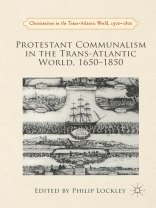This book explores the trans-Atlantic history of Protestant traditions of communalism – communities of shared property.
The sixteenth-century Reformation may have destroyed monasticism in northern Europe, but Protestant Christianity has not always denied common property. Between 1650 and 1850, a range of Protestant groups adopted communal goods, frequently after crossing the Atlantic to North America: the Ephrata community, the Shakers, the Harmony Society, the Community of True Inspiration, and others. Early Mormonism also developed with a communal dimension, challenging its surrounding Protestant culture of individualism and the free market. In a series of focussed and survey studies, this book recovers the trans-Atlantic networks and narratives, ideas and influences, which shaped Protestant communalism across two centuries of early modernity.
विषयसूची
Introduction by Philip Lockley. - 1. Mapping Protestant Communalism, 1650-1850 by Philip Lockey. – 2. The Ephrata Community in the Atlantic World by Jeff Bach. – 3. Believers in Two Worlds: Lives of the English Shakers in England and America by Christian Goodwillie. – 4. The Harmony Society in Württemberg, Pennsylvania and Indiana by Hermann Ehmer. – 5. The Trans-Atlantic Odyssey of the Community of True Inspiration, 1714-1850 by Peter Hoehnle. - 6. Mormon Communalism and Millennialism in Trans-Atlantic Context by Matthew J. Grow and Bradley Kime. - 7. Trans-Atlantic Reputations: Protestant Communalism and Early Socialism by Philip Lockley
लेखक के बारे में
Philip Lockley has taught history and theology at the University of Oxford, UK, where he has been British Academy Postdoctoral Fellow in the Faculty of Theology and Religion, and College Lecturer in Theology, Trinity College, Oxford.












